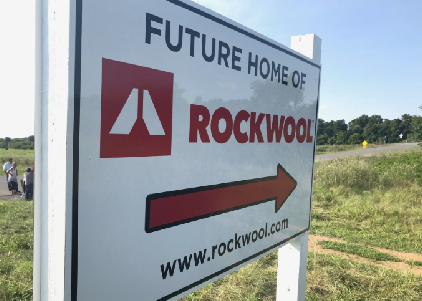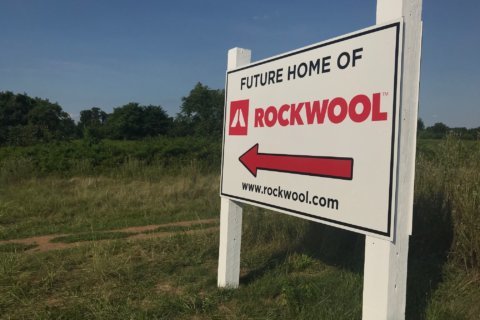WASHINGTON — A judge has denied a motion by a watchdog group representing concerned residents that filed a lawsuit to immediately stop construction of a 24-hour-a-day insulation factory on a former apple orchard in Jefferson County, West Virginia.
The suit, filed Monday night, claimed the agreement to bring the Denmark-based Rockwool factory to Ranson, West Virginia, involved no-bid contracts, violated ethical guidelines and was rushed through in an effort to deny the public an opportunity to review and provide input on the deal.
On Tuesday afternoon, Jefferson County Circuit Court Judge David Hammer denied the motion, writing, “Plaintiffs have failed the essential showing of irreparable harm necessary to obtain an injunction.”
Despite the setback, the citizen group’s lawsuit will continue to move toward trial.
The lawsuit was filed in Jefferson County Circuit Court by Jefferson County Vision, a nonprofit formed out of Citizens Concerned Against Rockwool Ranson, WV, a Facebook group with more than 11,000 members. It wasn’t against Rockwool, but the Jefferson County Development Authority — one of several parties in the agreement to lure the company to Ranson, West Virginia.
Tuesday, Rockwool filed a motion to also be a defendant in the suit.
Amanda Foxx, a board member of Jefferson County Vision posted to the Facebook group: “We are in court! The judge ruled today that he is not taking immediate action to stop the water bond, but our case against the JCDA on this matter is moving forward.”
In the days after the June 26 groundbreaking for construction of the factory, which will melt rocks into lava to be spun into rock wool insulation, public awareness rose about the more than 2 million pounds of yearly emissions the factory will emit, in projections to the U.S. Environmental Protection Agency.
Powered by social media, a growing number of people who live and spend time in the county expressed anger about the plan to bring heavy industry, and specifically the emissions it generates, to Jefferson County.
Fear of the health risks has sparked opposition from parents, worried about the effects on children in four nearby schools, as well as neighboring Loudoun County, Virginia. Rockwool President Trent Ogilvie told WTOP the health of residents, and the environment, will not be negatively affected by the factory.
According to the suit, the JCDA plans to issue a $7 million, 40-year bond and use the proceeds to construct, manage and own a water line extension to the Jefferson Orchard site, where the Rockwool plant is being built.
The JCDA is giving the local water company, Jefferson Utilities, a no-bid service contract at a nominal rate of pay, according to the filing.
“At the end of the contract, the JCDA will give Jefferson Utilities millions of dollars of infrastructure for just one dollar,” according to a release from Jefferson County Vision.
The deal to build the factory is enmeshed in a labyrinth of tax relief, water line, and sewer line agreements, involving Jefferson County, its appointed development authority, Charles Town, and the West Virginia Development Office.
In the injunction, attorneys S. Andrew Arnold and Christopher Stroech, and firm of Arnold & Bailey asked the court to immediately stay all actions of the JCDA, which was expected to cast a vote on whether to approve the bond Tuesday afternoon.
In his ruling, Judge Hammer wrote: “The Court finds nothing in the record of this case that would establish that the JCDA is a public utility.”
Hammer’s ruling acknowledged his decision came without benefit of a hearing.
“While this Court is not able to plumb the depths of permissible public financing in such a compressed time period, the Court notes that there does not appear to be any possibility of public liability should repayment of the bond fail,” according to the judge.
After meeting in executive session, the JCDA tabled its vote until October. It is unclear whether the agency was aware that the court had denied the request to prevent the vote, when it decided to delay the vote.
As of Tuesday morning, construction at the Rockwool site continued.
Last week, an attorney for Rockwool said the company would take legal action “if the local government entities renege on their promises.”
The Jefferson County Board of Education requested an independent human health risk investigation, which is underway.
Michael Zarin, vice president of communications for Rockwool Group, told WTOP: “While Rockwool is not party to the filing, we continue with our $150 million community investment that Jefferson County actively recruited us to make.”
Ogilvie has said despite mounting public opposition, “We will be building the factory.”







